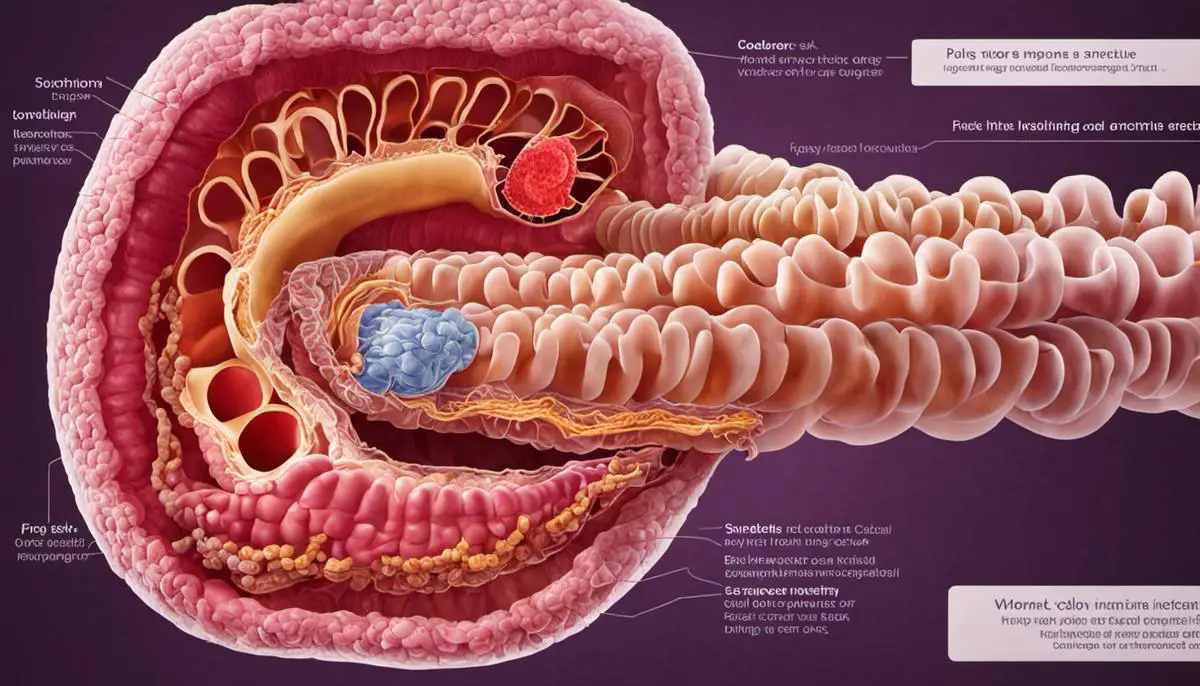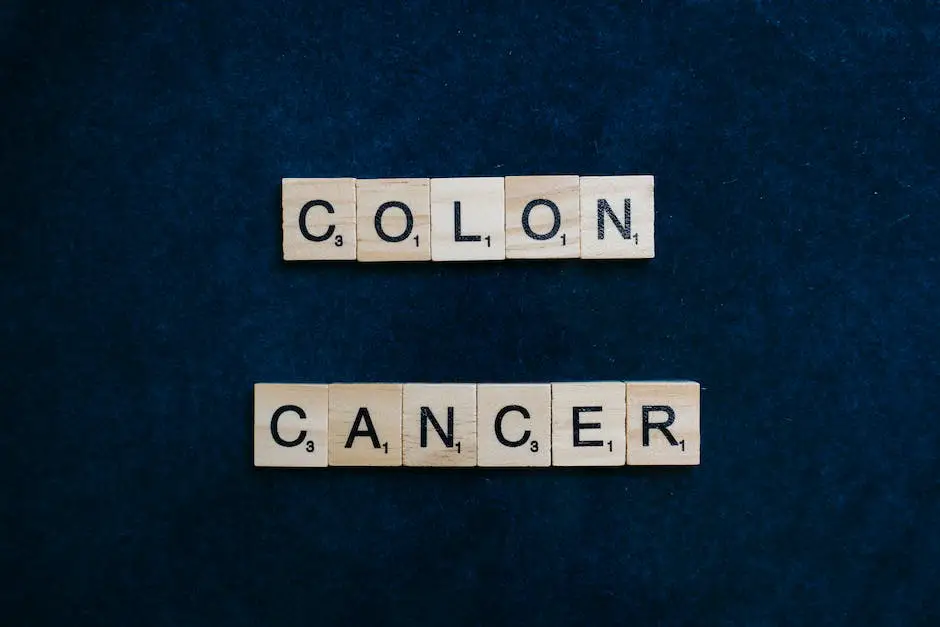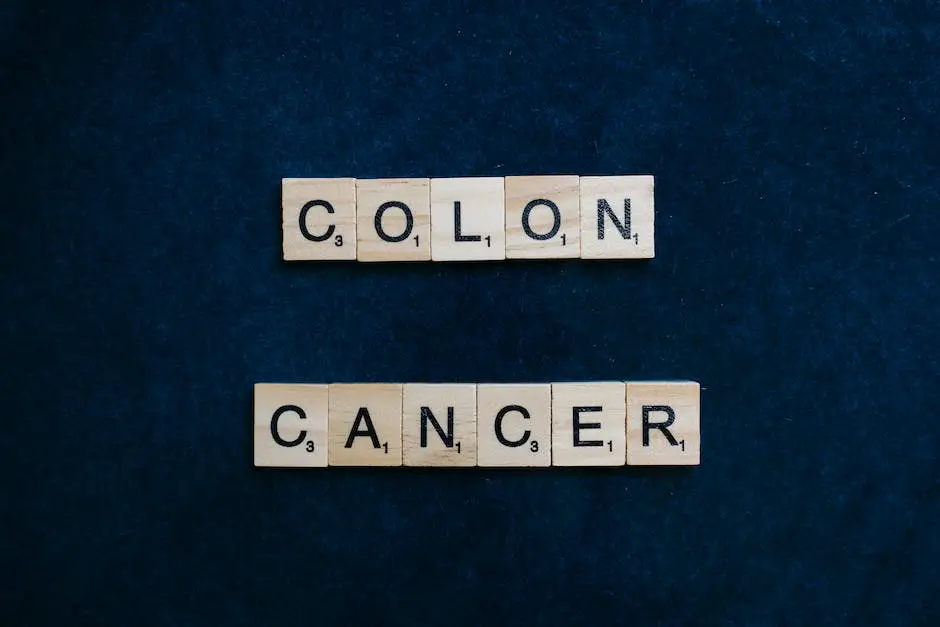The role of diet in the prevention and development of diseases is increasingly becoming a scientific, social, and medical focus point. One such disease that warrants significant attention is colon cancer. It’s a common form of cancer, which depending on its stage and the patient’s health, can either be harmless or lethal. Despite advances in conventional treatments, the incidence of colon cancer in the population continues to rise, prompting growing interests in preventive strategies. This is where the significance of understanding how an individual’s diet can influence the risk of developing colon cancer becomes crucial. This article aims to illuminate the connections between dietary habits and colon cancer, providing practical insights for those interested in healthfully adapting their eating and lifestyle habits.
Understanding Colon Cancer
Understanding Colon Cancer: An Overview
Colon cancer, also known as colorectal cancer, is a type of cancer that begins in the large intestine (colon). It typically starts as small benign groups of cells known as polyps. Over time, these polyps can turn into colon cancers.
Risk factors for colon cancer include age, high-fat diet, race, family history, and certain inherited conditions. The majority of patients diagnosed with colon cancer are older than 50; however, it can occur at any age.
Symptoms of colon cancer can include changes in bowel habits, such as diarrhea, constipation, or narrowing of the stool that lasts for more than a few days, persistent abdominal discomfort, or unexplained weight loss. However, by the time these symptoms are noticeable, the cancer has often progressed to advanced stages.
Diagnostic procedures for colon cancer include colonoscopies, where doctors examine the full length of the colon, and sigmoidoscopies, which only examine the lower part of the colon. Blood tests also play an integral role in early detection.
Treatment options for colon cancer vary depending on its stage and can range from minimally invasive, such as removing polyps during a colonoscopy, to more advanced treatments such as chemotherapy, radiation therapy, or surgery to remove the affected parts of the colon.
Exploring the Impact of Diet on Colon Cancer
There has been a recognition in recent years of a potent relationship between diet and the vulnerability to colon cancer. Studies point out that eating patterns that are high in red and processed meats, or low in fruits and vegetables, as well as diets loaded with sugars and refined grains, are linked with a higher possibility of developing colon cancer.
The amount of fat in one’s diet, notably animal fat, arises as a primary concern. A diet dense with fat causes an increased release of bile acids into our digestive tract, potentially fostering tumor growth. Saturated fats, particularly those found in animal products, can be especially harmful and have been linked to a heightened risk of colon cancer.
Conversely, diets abundant with fiber have shown potential in lowering the risk of colon cancer. Fiber aids in maintaining a healthy digestive system by preventing constipation and formation of polyps.
Vegetables, fruits, and whole grains, all rich sources of fiber, also provide antioxidants and phytochemicals that might assist in reducing cancer likelihood. These vital components prevent cellular damage that could lead to cancer development.
There is also evidence supporting that diets higher in calcium and vitamin D could safeguard against colon cancer. It is suggested that regular consumption of lean proteins, for instance, fish, chicken, beans, or lentils, as opposed to red or processed meats, could diminish your risk.
Notably, lifestyle choices dovetail with diet in influencing colon cancer risk. Regular physical activity, maintaining an ideal body weight, and disciplined alcohol consumption can act in synergy with a balanced diet in lessening the risk of colon cancer.
In concluding, while certain factors leading to colon cancer, like age and hereditary genetic disorders, might not be within our control, diet is an aspect where we have significant influence. A well-balanced diet and lifestyle can aid in reducing colon cancer risk, promoting overall health and well-being.

The Role of Diet in Colon Cancer
Delving Deeper into the Role of Diet in Colon Cancer Risk
The role of an individual’s diet as a determinant of their risk of developing colon cancer cannot be emphasized enough. Numerous studies over time have solidified the correlation between dietary patterns and the incidence of colon cancer, identifying specific foods and dietary habits as contributory factors. Depending on their categorization and frequency of consumption, these dietary components could increase or decrease the risk of this exasperating illness.
Potential Risk Factors for Colon Cancer
One potential risk factor for colon cancer is a diet high in red and processed meats. Various research has suggested that a regular intake of these foods increases the risk of colon cancer. This is believed to be related to the chemicals present in red and processed meats, including heme iron, nitrates, and certain fats. These compounds enhance the production of carcinogens during the cooking or preservation process, or within the gut upon digestion.
Another dietary concern is excessive alcohol consumption, which is thought to irritate the lining of the intestines and potentially lead to tumor formation. Alcohol could also alter the body’s ability to absorb key nutrients, impairing immune function and increasing vulnerability to cancerous changes.
Beneficial Dietary Habits in Colon Cancer Prevention
Conversely, some foods and dietary strategies are associated with a lower risk of colon cancer. A high-fiber diet, consisting of whole grains, fruits, vegetables, and legumes, is consistently linked to a lower risk. The theory is that dietary fiber speeds up the passage of food through the gut, minimizing the time that the bowel lining is exposed to potential carcinogens in our diet.
Moreover, foods rich in calcium and vitamin D have also been associated with a decreased risk of colon cancer. These nutrients seem to help prevent abnormal division and survival of colon cells. They are found in foods like dairy products, fatty fish, and fortified foods or can be obtained through supplements.
Carcinogenic Foods and Their Impact on the Digestive System
Food, as a source of nourishment, becomes part of our bodies through digestion. However, some foods contain substances that could potentially cause cell damage, leading to uncontrolled growth and development of tumors. These are called carcinogenic foods. When consumed regularly and in large quantities, these foods can increase the risk of colon cancer.
Naturally occurring or added chemicals in some foods, such as aflatoxins in peanuts and corn, or the nitrites in certain preserved foods, can pose a risk. Deep-frying, grilling, or barbecuing meats can also lead to the formation of carcinogenic compounds like heterocyclic amines and polycyclic aromatic hydrocarbons.
Meanwhile, other compounds found in foods like fruits and vegetables have anti-carcinogenic properties and can protect against cancer. These include antioxidants, vitamins, and polyphenols, which help prevent cellular damage and inflammation, and enhance detoxification processes.
Understanding the Impact of Diet on Colon Cancer
The role our diet plays in our health is undeniably significant, particularly in relation to colon cancer risk. Food items and dietary habits, including the consumption of carcinogenic foods or an overreliance on red and processed meats, have been identified as potential risk factors for developing colon cancer. On the other hand, maintaining a balanced diet packed with nutrients obtained from a variety of fruits, vegetables and whole grains can significantly contribute to the prevention of colon cancer and overall health improvement.

Dietary Changes for Colon Cancer Prevention
Unpacking the Relationship between Dietary Habits and Colon Cancer Risk
As the realm of scientific research is continually evolving, increased emphasis is being placed on the connection between diet and colon cancer risk. Certain dietary habits have been recognized for their potential to increase or decrease susceptibility to the disease, all based on their impact on colon health. For instance, regular intake of red and processed meats has been consistently associated with a higher risk of colon cancer. Conversely, a diet high in fruits, vegetables and whole grains tends to have a protective effect against the disease. It’s also important to note that alcohol consumption and obesity are seen as significant risk factors, with consistent alcohol intake and a diet leading to obesity potentially elevating the risk.
Guidelines for a Cancer Prevention Diet
Cancer prevention dietary guidelines usually emphasize the importance of maintaining a balanced diet. The American Cancer Society (ACS) advises regular consumption of a varied diet, rich in vegetables, fruits, and whole grains. It is recommended to limit the consumption of processed and red meats. Further, they recommend maintaining a healthy weight and limiting alcohol consumption.
Increasing the intake of dietary fiber is also suggested, as fiber supports healthy digestion and colon health. A diet laden with fiber can contribute to fewer instances of constipation, maintain a healthier body weight, and reduce the risk of colon cancer.
Crucial Nutrients and their Dietary Sources
Certain nutrients also play pivotal roles in maintaining colon health and hence possibly reduce the risk of colon cancer. Calcium and Vitamin D, for instance, are believed to be protective against colon cancer, although their exact mechanisms of action are still being studied.
Fish, lean poultry, nonfat dairy products, tofu, and legumes are excellent sources of Calcium, while Vitamin D can be obtained from oily fish, fortified dairy or plant-based products, and exposure to sunlight.
Practical Dietary Recommendations
Creating positive and lasting modifications to your diet can often feel daunting. However, by implementing minor changes slowly over time, the process can become quite manageable. Aim to incorporate more vegetables and fruits into all of your meals. Choose whole grains like brown bread, whole wheat pasta, and oats as an alternative to refined grains such as white bread and rice.
It’s important to remain aware of portion sizes, particularly when consuming foods high in calories. Substitute processed and red meats with lean proteins such as fish, poultry, and plant-based proteins such as lentils, nuts, or beans. Restrict your alcohol consumption and make a point of staying well-hydrated by drinking plenty of water or herbal tea.
Lastly, opt to prepare meals at home more frequently. Doing so gives you full control over what you’re putting in your food, enabling you to minimize the use of unhealthy ingredients and maximize the use of fresh, nutrient-rich ones. Always keep in mind that each small change can greatly contribute to long-term health benefits, including potential reduction in the risk of colon cancer.

Case Studies and Expert Opinions
Understanding the Link between Diet and Colon Cancer
There has been a wealth of research exploring the connection between the foods we consume and the risk of developing colon cancer. A key example of these studies is the European Prospective Investigation into Cancer and Nutrition (EPIC). The EPIC study engaged over half a million participants from 10 different European countries, and the findings were significant. A high intake of red and processed meats showed a strong correlation with an increased risk of colon cancer. Conversely, consuming foods rich in fiber, such as fruits, vegetables, and whole grains, appeared to provide a protective effect against this type of cancer.
Expert Opinions: The Dangers of Processed and Red Meats
Dr. Walter Willett, a professor of epidemiology and nutrition at Harvard Medical School, has voiced his concern about dietary habits and colon cancer. He points out that processed meats, in particular, contain carcinogens that can contribute to the development of colon cancer. However, he emphasizes that modifiable lifestyle factors like diet offer an opportunity to lower the risk.
Case Study: The American Health Professionals Follow-up
The Health Professionals Follow-up (HPFS) study, involving 51,529 men, includes dentists, veterinarians, pharmacists, optometrists, osteopathic physicians, and podiatrists. The accumulated data from the HPFS study has substantiated the deleterious effects of a high red and processed meat diet, and the benefits of fibre-rich diets in reducing the risk of colon cancer.
Expert Opinion: Cruciferous Vegetables and Colon Cancer
According to Dr. Edward Giovannucci, a professor of nutrition and epidemiology at the Harvard School of Public Health, cruciferous vegetables – such as broccoli, kale, cabbage, and cauliflower – contain compounds that may help prevent colon cancer. In a review study, he cited that higher intakes of these vegetables were associated with a lower risk of colon cancer.
The Beneficial Effect of Mediterranean Diet
In 2003, a case-control study was conducted in Italy, investigating the link between the Mediterranean diet and colorectal cancer. The study found that adherence to a Mediterranean diet – characterized by high consumption of fruit, vegetables, legumes, and cereals; a moderate intake of wine; and a low intake of meat and dairy products – was associated with a significantly reduced risk of colon cancer.
Expert View: The Role of Fiber
According to Dr. Andrew Chan, a gastroenterologist at Massachusetts General Hospital, a high-fibre diet can promote a healthy gut microbiome, which in turn can lower colon cancer risk. He argues that dietary fibre makes its way to the colon, where it is fermented by bacteria into short-chain fatty acids. These fatty acids appear to have anti-cancer properties.
Alcohol Consumption and Colon Cancer
A 2011 pooled analysis of eight cohort studies from North America and Europe, involving 489,706 participants, found that both men and women who consumed 50 or more grams of alcohol per day (approximately 3.5 or more drinks per day) had 1.5 times the risk of developing colon cancer as those who didn’t drink. The detrimental effects of alcohol on colon cancer incidence further strengthen the argument that lifestyle changes, especially dietary modifications, can play a significant role in colon cancer prevention.
Extensive case studies and expert opinions establish the integral role that diet plays in the prevention and management of colon cancer. This compiled evidence strenuously advocates that dietary modifications can significantly deter the occurrence or progression of colon cancer. The augmented proof infer that a diet that restricts the intake of red and processed meats and alcohol while increasing the consumption of fruits, vegetables, whole grains, and fibres greatly diminishes the chances of developing colon cancer. Furthermore, expert testimonies put emphasis on the pressing need to publicise healthier dietary options to amplify the reduction in the prevalence of colon cancer.

Diet and Other Lifestyle Factors
The Connection Between Diet and The Risk of Colon Cancer
Nutrition heavily dictates our overall health status and, specifically relating to colon cancer, certain classes of food have been flagged as pivotal factors in altering the risk of developing the disease. The consumption of processed and red meats, refined grains and sugar-laden beverages, coupled with a high-fat, low-fiber diet, have all been correlated with an escalated risk of colon cancer. On the other hand, a diet abundant in fruits, vegetables, whole grains, lean proteins and minimal processed foods are reported to offer a protective shield against the illness.
Certain specific nutrients like calcium and Vitamin D have shown some promise in being linked with a lowered risk of colon cancer. The presence of Omega-3 fatty acids, which are especially prevalent in fish such as salmon, mackerel, and tuna, have also been associated with a reduced risk of colon cancer, thanks to their anti-inflammatory properties.
Interaction between Lifestyle Factors and Diet in Determining Colon Cancer Risk
But diet is not the only factor that influences colon cancer risk. Other lifestyle factors, such as physical activity and tobacco usage, significantly interact with diet and affect the risk as well.
Adequate physical activity is seen as a protective factor against colon cancer, as it can reduce body fat percentages, regulate metabolic rates, and improve the immune function overall. Physical activity can also enhance the metabolism of bile acids, decrease the time food waste stays in the intestines, and promote a healthy digestive environment, all of which lowers the risk of colon cancer.
On the other side, tobacco use substantially increases the risk of colon cancer. Tobacco smoke contains more than 60 known carcinogens. When inhaled, these substances can affect organs throughout the body, including the colon. The effects of tobacco use can change the way the body metabolizes food and nutrients, which can negatively interact with an individual’s diet and increase colon cancer risk.
Balancing Diet and Lifestyle for Colon Cancer Prevention
Understanding the interplay between your diet and lifestyle choices can guide you towards better colon health. Balancing a healthy diet with regular physical activity while avoiding processed foods and tobacco use can drastically reduce your risk of colon cancer.
Moreover, integrating recommendations from official dietary guidelines as well as individualized dietary advice from healthcare professionals can aid in optimizing colon health. It is important to remember that these factors are often interconnected, and therefore, while diet can heavily influence colon cancer risk, it should not be considered in isolation.
In conclusion, colon cancer risk is influenced by a confluence of dietary and lifestyle factors. Therefore, a comprehensive approach that includes a balanced diet, regular physical activity, and avoidance of tobacco use is key to averting the risk of colon cancer.

Photo by bruno_nascimento on Unsplash
It’s vital to remember that diet forms only one piece of the puzzle when it comes to colon cancer. Despite its significance, it’s part of a complex interplay of various other lifestyle factors including physical activity, tobacco use, and the genetic component that are also critical in shaping one’s health. The value of incorporating scientific knowledge into everyday practice cannot be overemphasized. Optimizing dietary habits, maintaining regular physical activity, and avoiding harmful substances such as tobacco can collectively reduce the risk of colon cancer. Emerging research continuously reinforces the saying that prevention is better than cure, and places diet and lifestyle modifications at the forefront of colon cancer prevention.
